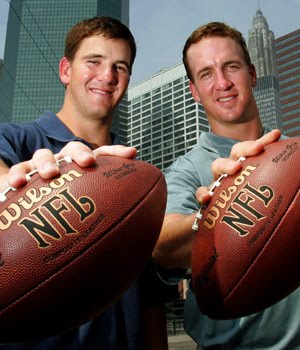 Siblings naturally compete with each other in all areas of life and sports can increase sibling rivalry. When siblings are involved in sports, especially the same sports, they compete for praise and attention from parents often to be recognized as the better athlete. Some siblings are jealous of each other and hold grudges while others show support and give encouragement.
Siblings naturally compete with each other in all areas of life and sports can increase sibling rivalry. When siblings are involved in sports, especially the same sports, they compete for praise and attention from parents often to be recognized as the better athlete. Some siblings are jealous of each other and hold grudges while others show support and give encouragement.
When siblings compete in sport as teammates or opponents there will always be a rivalry present which can be positive. It pushes them to become better athletes and teaches them how to handle conflict, cooperate, and manage frustration and aggression. Sports parents should teach their athletes how to handle conflict in an appropriate manner and encourage them to work it out on their own.
In all their years competing amongst one another NFL quarterback Eli Manning says he has only defeated his older brother and opposing NFL quarterback Peyton Manning once in a basketball game.
“I was about 17, 18 years old,” Eli says. “It was in the backyard… We both had cuts, and it was a brutal game.”
“On the winning basket he made a little counter step on me,” Peyton says, grimacing slightly. “I remember that he did dunk in that game, which was a huge step. Anytime your younger brother dunks on your older brother, that’s a huge step.”
After the game the brothers acknowledged this huge step in their rivalry with a half-hearted handshake. “We separated and didn’t talk for a few hours. I’m not a guy who rubs it in. You go your separate ways, and by the night or the next day it’s over.”
How can parents help make sibling rivalry a positive experience for their athletes?
First, avoid putting too much emphasis on success to prevent jealousy. Of course your athlete’s accomplishments are important, but not at a sibling’s expense. When athletes do not perform as well as their siblings they may feel disappointed or frustrated.
To avoid this parents should praise hard work despite how well their athlete performs. Emphasizing effort rather than success will help your athletes persist in the face of failure, and give them a sense of control over how they perform.
Second it is important for parents to recognize when they are playing favorites. Parenting isn’t perfect, so yes this happens. Parents sometimes unknowingly support one child more than the other.
For example dad getting more involved with football one kids interest, than soccer another kids interest. Sometimes one athlete might play a sport you know nothing about, while the other plays a sport you are passionate about. Another example is when parents get caught up with coaching older athletes, and have difficulty finding time equally supporting younger athletes. To make sibling rivalry a positive experience it is important that you balance your level of involvement and support between your athletes.
Third, avoid making comparisons among siblings. These comparisons generate tension that can affect your athlete’s self-esteem. When parents talk about one athlete’s successes more than others, it can also lead to resentment making their rivalry a negative experience.
Finally, keep sports-related competition on the field. Parents should not let competitiveness of a game continue at home. Siblings need to take a breather. This also gives them time to go their separate ways and cool off.
Competition is a natural phenomenon among siblings. Whether it’s competing over the remote control, or who has a better shot, at the end of the day siblings with always be members of the same team. As parents and team captains your job is to support your players equally and encourage healthy levels of competition.


























Excellent post I can really relate to the topic. My twins both just started playing baseball on the same team in high school so we are constantly dealing with the rivalry. It is definitely a challenge at times to balance support even with my sons being in the same age and on the same team. After games if one does well and the other doesn’t it puts me in a dilemma… Praising hard work rather than success may be the solution to my problem! Thanks for the advice!
Who is the author of this article?
All articles unless stated otherwise were written by Michael J Edger, MS, MGCP
Mike@mentaledgeathletics.com
407-385-9798